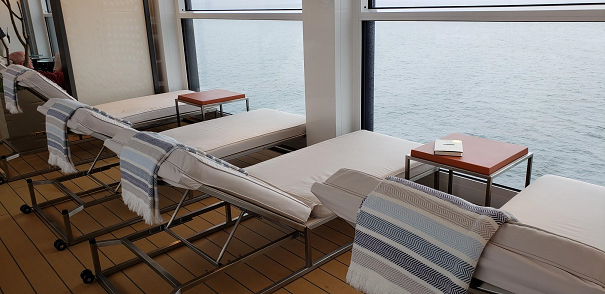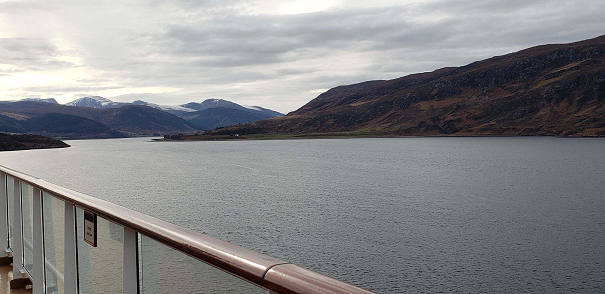Last Updated on December 8, 2022
PREFERRED PRIVACY: Flash Fiction by resident Julie Helms
On the second day of the cruise, during her self-guided exploration of each deck, she decided, for future reference, that any one of the lounge chairs lining both port and starboard on Deck 7, would be ideal. The indoor pool occupied the middle of this forward end of the deck. Carefully placed lunch tables and chairs as well as comfortable seating surrounded the pool. But these periphery lounge chairs, three steps down from the pool level and facing the sea, had their backs to the pool in an understatement of preferred privacy.
Waiters patrolled, gliding fore and aft, behind the chairs, carefully assessing the needs of each passenger. Water? Coffee? A Banana Smoothie? Something from the bar? No. No, thank you. Nothing, thank you. Each offer was a polite interruption, a tiny intrusion into her world of the words she was writing, reading, thinking. Smiling to the waiters, they’re just performing their jobs, she reasoned.
Other passengers travelled well-prepared with blank pages bound into pretty books marketed specifically for personal journaling. She had packed, at the last minute, a barely used, tiny notebook, stored for years in a cubby of her living room desk. A ball point pen, gratis from her dermatologist’s office, felt comfortable to hold, and it wrote as smoothly as any Cross or Mont Blanc.

Whenever possible, when not sightseeing on shore, or joining friends for non-stop dining, or attending a lecture in the theater, she stole away to a lounge chair on Deck 7 and indulged in several hours of what she loved best: writing.
On the eighth day, after several hours of writing, reading, and napping, she swung her legs around to the side of her lounge chair, slipped her shoes back on, and just sat, contemplating her next move.
“Hey lady,” his voice loud and harsh and twangy. “You finally finished writin’? You been writin’ all day.”
He stood on the pool level, above and behind her chair, grinning. She responded just enough to avoid appearing unfriendly or grumpy. He kept talking, offering personal information. She resented the pressure to reply with similar tidbits about her home city, and she momentarily wondered how long he’d been watching her. Eventually, he drifted away, but he reappeared two days later with more unsolicited commentary.
“You know,” he advised, “you gotta make your own happiness.” Apropos of nothing, “You can’t depend on other people to make you happy.”
Again, she barely acknowledged him. “Mm-hmm.” But he would not be discouraged. “You can’t have expectations. You’ll get disappointed,” all the while smiling at her. Finally, after receiving no replies, he slowly walked away.
At last, the sun on the fifteenth day was bright and hot in a blue sky just slightly linty with a few delicate clouds scooting around in a light breeze. It was a day at sea, no ports of call, no on-shore excursions. Some passengers welcomed the chance to venture out on their first warm day, walking laps around Deck 2,

the Sun Deck. Up there, aft on the top deck of the ship, she easily located a large canvas-covered corner sofa with sufficient pillows to soften its inner right angles. Stylish plate glass panels topped with smooth wooden rails allowed her, as she reclined, to watch the ship’s endless wake, admire the vast flatness of the horizon. She brought only what she needed: her half-read novel now studded with scribbled papers, book marks, and maps, and her plastic pen. She wrote. She read. She closed her eyes.
His voice was abrupt and rude. “So this is where you are today! Did you miss me?” Too intimate a question, she thought, frowning and casually scanning the area for other passengers. “Well, I missed you!” he drawled. “By the looks of that book all stuffed with papers, I can see you been busy.”
“Mmmm,” as she attempted to ignore his presence.
“Let’s see what you got there.”
“No, I don’t think so,” gathering her belongings and preparing to move quickly.
“I know. You think I can’t read. Here…let me take a look,” reaching for the novel.
“No. I’m leaving now.”
But he grabbed for her book. It opened, all her notes and maps and bookmarks fluttering and flying out.
She became furious actor and spectator of her own fury simultaneously, lunging at him, pushing him, bending him backward over the wooden rail, watching him fall, in slow motion yet instantly, and crash loudly in an unnatural position onto a vacated lunch table on Deck 7 below her. Immediately, she backed away from the rail. Immediately, she ran to retrieve her book and papers, now plastered firmly by the wind against the plate glass. Immediately, she heard a woman’s voice, screaming, “Oh my God! Oh God! Someone fell!”
Within seconds, crew members and other passengers were running past her. She pretended to appear shocked and concerned. In the confusion, no one noticed as she retreated from the scene to her stateroom.
She sat on her bed, clutching her belongings and staring out at the sea until the sun set. Silently, she opened her novel and began taking inventory. Her eyes widened upon discovering one missing page of notes. She assumed…no, hoped…that the wind had carried it out to sea.
Throughout dinner, the fatal accident, as it was called, was the only topic of conversation among passengers, while crew tried to maintain balance between professional concern and compassionate reassurances.
At 10 p.m. her stateroom bell rang. “I think this is yours,” the busboy from Deck 8 said simply, looking directly into her eyes as he handed over the missing page of notes. She thought she saw him wink before moving across the ship, toward starboard.
